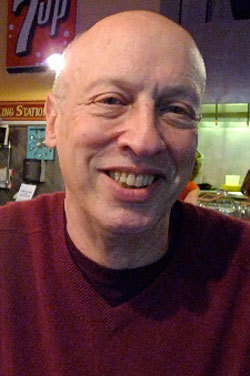LOS ANGELES – Peter Bergman, a founder of Firesign Theatre, the comic quartet that channeled the absurdist sensibility and chaotic impulses of the countercultural 1960s and ’70s into a popular radio show and a series of cult-classic albums, has died at 72.
A longtime Los Angeles resident, Bergman died of complications of leukemia Friday at St. John’s Health Center in Santa Monica, according to his former wife, Maryedith Burrell.
Bergman was hosting an alternative, late-night talk show on the Los Angeles Pacifica radio station KPFK-FM in 1966 when he started Firesign Theatre with Phillip Proctor, David Ossman and Phil Austin. Their stream-of-consciousness comedy, a blend of the daffy and the surreal, spoke to a generation in rebellion.
It also caught the attention of executives at Columbia Records, which released four albums between 1968 and 1972: “Waiting for the Electrician Or Someone Like Him,” “Don’t Crush That Dwarf, Hand Me the Pliers,” “How Can You Be in Two Places At Once When You’re Not Anywhere At All” and “I Think We’re All Bozos on This Bus.” Fans of the albums began to call themselves “Fireheads” and could recite long passages from memory.
The Washington Post once described the Firesign experience as “an impolite talk show where the host has lost control,” with recurring characters using names like Nick Danger and Mudhead riffing off one another.
Bergman acknowledged the seemingly random nature of the group’s shows, which, he said in 1998, were “jazz-like performances, filled with hidden jokes and meanings that even we do not always intend when we write the material.”
Bergman was born in Cleveland on Nov. 29, 1939, and by sixth grade was writing comic poems with his mother.
In high school, he was an announcer on the campus radio system, but was dismissed when he joked that Communists had taken over the school. The principal, Russell Rupp, who issued the discipline was the inspiration for the Firesign character Principal Poop.
At Yale, Bergman became managing editor of the campus comedy magazine and met one of his future Firesign collaborators, Proctor, an acting student.
After earning a degree in economics, Bergman remained at Yale for two years to pursue fellowships in teaching and playwriting. After a short stint in the Army, he went to Berlin on a Ford Foundation grant.
He returned to the U.S. in 1966 and became co-host of a show on KPFK called “Radio Free Oz,” which started at midnight and featured four hours of music, comedy and phone-ins.
Ossman, Austin and Proctor all found themselves in the studio with Bergman one night and improvised a show that spoofed film festivals. Thus was born Firesign Theatre, a name conceived by Bergman as a send-up of the vintage radio program Fireside Theatre and a nod to the fact that he and his comic comrades all had astrological signs associated with fire.
They were not only children of the ’60s, but instigators of the era’s free-flowing spirit. In April 1967, a few months after San Francisco’s Human Be-in — the countercultural festival where guru Timothy Leary made his famous call for America’s youth to “turn on, tune in, drop out” — Bergman organized L.A.’s first “love-in.” What he envisioned as a picnic in Elysian Park for a few hundred fans turned into what The Times described as an “Easter Sunday freak-out” for 4,000.
Firesign’s members split up and reunited several times over the ensuing decades, along the way producing shows on National Public Radio and HBO.
Copy the Story Link
Send questions/comments to the editors.



Success. Please wait for the page to reload. If the page does not reload within 5 seconds, please refresh the page.
Enter your email and password to access comments.
Hi, to comment on stories you must . This profile is in addition to your subscription and website login.
Already have a commenting profile? .
Invalid username/password.
Please check your email to confirm and complete your registration.
Only subscribers are eligible to post comments. Please subscribe or login first for digital access. Here’s why.
Use the form below to reset your password. When you've submitted your account email, we will send an email with a reset code.